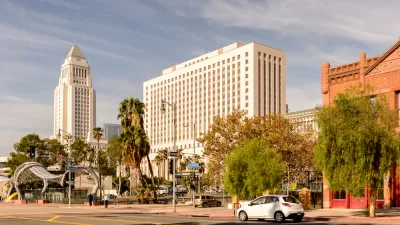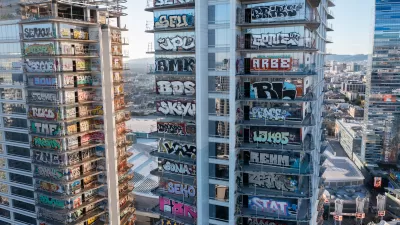Los Angeles is experiencing an elevated anti-growth conversation and suspicion of insider dealings at City Hall. In the midst of this, a councilmember known as an "outsider" aims to reconcile his constituents with the city's development processes.
David Ryu represents the Fourth District, a region rich with iconic L.A. landmarks: "Museum Row, Griffith Park, Runyon Canyon, the Hollywood sign, the Original Farmer’s Market, and the Grove are all in CD 4. We have everything."
Neighborhoods within the district are concerned with the impacts of congestion and mansionization. Some are now clamoring for inclusion in the city's Baseline Mansionization Ordinance.
Ryu is supporting his constituents' push for temporary moratoriums on oversized residential projects. But he says his short time in office has already taught him that growth isn’t at the core of development conflicts.
"During the campaign, it seemed on the surface like the community was frustrated about development," he tells The Planning Report. "But the root issue is lack of trust and lack of communication with government."
The former healthcare professional's platform blasted City Hall relationships with developers—a source of public suspicion that Ryu says is the real impetus behind putatively anti-growth efforts like the Neighborhood Integrity Initiative. During his campaign, Ryu refused, and in some cases returned, donations from developers. Now in office, he means to build community trust in the development process from the ground up.
"When it comes to planning, it’s about first gaining trust around the small things, like potholes or tree trimming," he says. "Constituents have to feel confident in these small things so that when you say you’re going to do bigger things, they have that trust."
One project in the works aims to ease the pain of overcrowded tourist destinations with a transportation-management plan, which Ryu hopes will ultimately link popular landmarks, their surrounding neighborhoods, and Metro stations throughout the district.
In The Planning Report, Ryu argues that paying attention to community concerns and adhering to an open process can pay off for developers by increasing efficiency, rather than bogging projects down.
"If you’re a developer, you can show me a nice presentation and I can give you all the zoning variances and zone changes you want, but guess what happens? A lawsuit," he says. "Whether you win or lose is irrelevant: For business, time is money. Getting held up for one to two years in litigation doesn’t help anybody."
Of course, "getting held up" is a problem for the city, too, and Ryu recognizes that it isn’t necessarily a consequence of corruption: City Hall has not recovered from cuts to staff during the 2008 recession, nor from disinvestment in professional development and capacity-building technology.
FULL STORY: LA City Councilmember Ryu’s Top Priority: Constituent Engagement to Build Public Trust

Planetizen Federal Action Tracker
A weekly monitor of how Trump’s orders and actions are impacting planners and planning in America.

San Francisco's School District Spent $105M To Build Affordable Housing for Teachers — And That's Just the Beginning
SFUSD joins a growing list of school districts using their land holdings to address housing affordability challenges faced by their own employees.

The Tiny, Adorable $7,000 Car Turning Japan Onto EVs
The single seat Mibot charges from a regular plug as quickly as an iPad, and is about half the price of an average EV.

As Trump Phases Out FEMA, Is It Time to Flee the Floodplains?
With less federal funding available for disaster relief efforts, the need to relocate at-risk communities is more urgent than ever.

With Protected Lanes, 460% More People Commute by Bike
For those needing more ammo, more data proving what we already knew is here.

In More Metros Than You’d Think, Suburbs are Now More Expensive Than the City
If you're moving to the burbs to save on square footage, data shows you should think again.
Urban Design for Planners 1: Software Tools
This six-course series explores essential urban design concepts using open source software and equips planners with the tools they need to participate fully in the urban design process.
Planning for Universal Design
Learn the tools for implementing Universal Design in planning regulations.
Smith Gee Studio
City of Charlotte
City of Camden Redevelopment Agency
City of Astoria
Transportation Research & Education Center (TREC) at Portland State University
US High Speed Rail Association
City of Camden Redevelopment Agency
Municipality of Princeton (NJ)





























